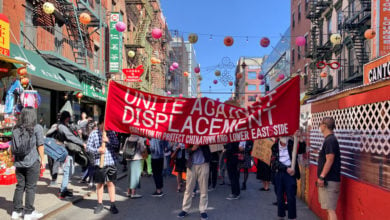One of the big challenges facing an imperialist ruling class when it comes to fighting a war is justifying that war to the population. This is especially so when there is no clear national security threat posed by the targeted nation. To meet the challenge, the war-makers have advanced the slogan of, “humanitarian intervention” and insisted on their “responsibility to protect” the human rights of victimized peoples. This false presentation has been utilized repeatedly either to win public support or muffle opposition to wars against countries that have had the audacity to stand in the way of U.S. geopolitical designs.
While the stated justifications for intervention may vary, the latest U.S. wars on Afghanistan and Iraq both used women’s rights as a slogan and justification for intervention and regime change. Hillary Clinton said, regarding Afghanistan, “Women’s rights are a central part of the foreign policy of the Obama administration.”
When the U.S. first invaded Afghanistan, there was a great deal of attention on the reactionary anti-woman laws and policies of the Taliban, which had been ruling the country since 1996. Some feminist organizations even came out in support of the war because it was ostensibly being fought to “liberate Afghan women.”
Of course, many others recognized this for what it was: window dressing for an imperialist war and occupation. How could you claim to be helping women while bombing their country and killing them and their loved ones?
U.S. sponsored Taliban counter-revolution against women’s rights in Afghanistan
Improving the lot of women in Afghanistan was never a goal of the U.S. occupation. The Taliban emerged in the mid-1990’s as the dominant force in Afghanistan. The Taliban’s top leaders had been supported financially and politically by the CIA and by most western media outlets when they were struggling against a reform minded socialist government that came to power in 1978.
The CIA conducted its largest ever covert operation, using these figures along with Osama Bin Laden, to militarily defeat the socialist government. On the verge of being overwhelmed by this onslaught, the socialist government was saved in 1979 only by the Soviet Red Army intervention. The CIA’s operation, financing and arming forces including the Taliban’s top leaders, began before and not after the Soviet intervention in December 1979.
The Carter Administration and the Pentagon viewed the operation as a huge success since it drew the Soviet Union’s military into a difficult and long term commitment in Afghanistan’s civil war. Zbigniew Brzezinski, Carter’s National Security Advisor, said later that creating a super-right wing Islamist government was a small price paid for the larger objective of weakening the Soviet Union. When it comes to women’s rights, you cannot get much more cynical than that.
Upon coming to power in 1978, the socialist-led government had prohibited the selling of women into marriage and their execution for “marital infidelity.” It promoted women’s legal equality, canceled the debts of peasants and invested heavily in schools and hospitals. The government initiated a mass literacy campaign among Afghan women, who entered the workforce in huge numbers for the first time. CIA supported death squads murdered thousands of young idealistic literacy workers and teachers who went to the Afghan countryside to bring education to girls for the first time. The effort to reform Afghanistan and bring the countryside into the modern world was ultimately destroyed. The Soviets withdrew. The socialist government subsequently fell.
The Taliban became the government in 1996 following a brutal civil war between the various reactionary factions that had constituted the so-called mujahedeen fighters. The Taliban lynched the former socialist leaders after carrying out the public mutilation of their bodies. The U.S. government and the western media outlets did not make a big deal out of this at all.
The window dressing about “women’s rights” as a motivator for U.S. policy in Afghanistan has been stripped away since the start of the 2001 war. In fact, while the legal rights of women may have improved since the overthrow of the Taliban—for instance, women are no longer legally prohibited from working outside the home—the conditions of life for the Afghan people as a whole have deteriorated under the U.S./NATO occupation. There is a rising rate of suicide and attempted suicide among Afghan women. Domestic abuse and rape remain commonplace.
Now that it is clear that the United States and NATO cannot win in Afghanistan, imperialism is seeking a negotiated settlement with the insurgent forces, including the Taliban. U.S. imperialism is perfectly willing to use women’s rights as a bargaining chip to achieve a settlement that lets them avoid the appearance of defeat at the hands of insurgents in one of the poorest countries on the planet. This month, the U.S.-backed Afghan government supported an edict from fundamentalist clerics calling women second-class citizens and justifying domestic abuse in certain circumstances.
Women’s rights are no concern for U.S. ruling class
The fact of the matter is that women’s rights in Iraq and Afghanistan are of absolutely no concern to the U.S. ruling class or any other imperialist powers. Women’s rights only matter insofar as they can be used to popularize these two very unpopular wars. In 2010, Wikileaks released a cable that showed a CIA report sent to France suggesting that women’s rights should be used to bolster public support for the Afghanistan war.
Madeleine Albright, the first woman to become Secretary of State, once stated that the deaths of 500,000 Iraqi children from U.S. sanctions were “worth it” as far as U.S. interests were concerned. It is inconceivable that the same imperialist class could function as a vehicle for women’s rights.
The women’s rights justification for war is a new twist on the old “white man’s burden,” drawing on U.S. and Western-European chauvinism, cultural ignorance and racist stereotypes of Muslim women in particular. It omits a central point—that women remain deeply oppressed in the United States itself, with their rights constantly under assault.
Women will not be liberated through the destruction of their countries and the murder of their families. Women—just like all oppressed people—will be liberated through their own organizations and struggles against male supremacy, capitalism and imperialism.






